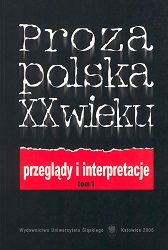Dialog z pejzażem. O »Cieniach w pieczarze« Stefana Kisielewskiego
Dialogue with landscape. About »Cienie w pieczarze« (Shadows in the Cavern) by Stefan Kisielewski
Author(s): Piotr Bajer
Subject(s): Polish Literature
Published by: Wydawnictwo Uniwersytetu Śląskiego
Keywords: Stefan Kisielewski;
Summary/Abstract: This article is an attempt at analyzing the problem of the relation of a literary hero with the reality of historical achievements, written in a shape of the world of matter and elements. The author’s argument concerns the novel written by Stefan Kisielewski entitled Shadows in the Cavern, and the main character in particular - Roman Zaleski. In the further parts of the article, the author takes up various aspects of reading the signs of historical transformations of the modern history of Poland, penetrating the psychology of human ideas about own presence in time and achievements. The interpretation of the phenomenon includes a paradox of constancy and changeability as the chief idea for the prose of Kisielewski. That is why the author of the analysis locates the figure of a literary hero in different referential contexts, which create a motive of intelligentsia reckonings with the old world. Much attention is drawn to the explication of permanent relations connecting the sensitivity of a created figure of the hero with the passing of physical and non-physical world. That is why the article is set in the psychological investigations into recognition of reality in its various issues and openings. // A taking up of the problem of searching for a literary form in order to properly express the most important experiences of a highbrow in a world constrained by totalitarian ideas. A struggle with the form is a necessary stage in creating an image of a man wanting to tell about his experiences in only seemingly normal rule of existence. // At the end of the article, the author suggests that the idea of postmodernity appears in the novel. Postmodernity would result in a destruction of a personality of a man in the world of consumption, divestation of axiological identity and departure from historical necessity of making a testimony about oneself.
Book: Proza polska XX wieku. Przeglądy i interpretacje. Tom 1
- Page Range: 102-120
- Page Count: 19
- Publication Year: 2005
- Language: Polish
- Content File-PDF

